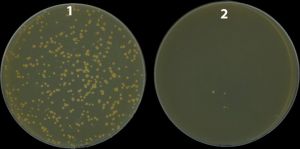To correct errors produced during DNA replication, some bacteria and archaebacteria use machinery different from that previously known in other living organisms.
These are the findings in a paper published in the scientific journal Nature Communications. The study was led by Jesús Blázquez, a scientist at the Centero Nacional de Biotecnología of the CSIC (CNB-CSIC), with participation of the Institute of Biomedicine of Seville (IBIS-CSIC), the Hospital Virgen del Rocío of Seville, the Hospital Gregorio Marañón in Madrid and researchers from the United Kingdom and Norway.
According to the authors, this discovery could have applications in the development of solutions to public health problems and environmental pollution, and to help improve biotechnological processes of industrial interest.
Meticulous proofreaders of the genetic material
The vast majority of organisms has a system responsible for reviewing and correcting the errors that occur when DNA is copied, thus preventing large numbers of mutations. "If this process fails, mutations accumulate and produce new gene combinations, with critical consequences. For example, pathogenic bacteria could easily acquire resistance to certain antibiotics, which cease to be effective against infection," Blázquez explains.
To date, this mechanism was considered unique to all living things. This study nonetheless shows that there is another, completely different mechanism.
"We discovered that some bacteria and archaeobacteria have a different correction system, in which the protein responsible for detecting and resolving these types of DNA errors is a protein called NucS", explain Blázquez and Alfredo Castañeda (two authors of the study). “The activity of this protein prevents some bacteria such as Mycobacterium tuberculosis, which causes tuberculosis, from easily acquiring resistance to antibiotics."
Tuberculosis is one of the deadliest diseases worldwide. There were nearly 1.8 million cases in 2015, and nearly 500,000 developed resistance to the two antibiotics most commonly used for treatment (WHO data), which forces a search for alternatives and greatly complicates treatment of the disease.
"To combat the development of antibiotic resistance in pathogenic bacteria, the first step is to understand the natural mechanisms that control the generation of mutations. The discovery of this mechanism might offer us strategies to impede the development of antibiotic resistance and the emergence of what have been called superbugs."
In addition, the researchers say that this discovery could facilitate the optimization of certain industrial processes.
New options for the biotechnology industry
"The discovery of this NucS-based system opens up numerous possibilities, since many microorganisms of industrial or ecological interest have such a system. For example, we can use genetic engineering to construct optimized variants of species such as Bifidobacterium and Streptomyces, widely used in industry", Blázquez says.
The research group has submitted an international patent application for the development of mutants in species of biomedical and industrial interest, including Mycobacterium, Streptomyces, Bifidobacterium, Rhodococcus, Pyrococcus and Thermococcus, that lack the newly described DNA correction system. These modified strains could be useful in industrial processes that produce compounds of interest such as antibiotics, antitumor drugs, immunosuppressants, herbicides, insecticides, or improved variants for use in bioremediation.
- A. Castañeda-García, A. I. Prieto, J. Rodríguez-Beltrán, N. Alonso, D. Cantillon, C. Costas, L. Pérez, E. D. Zegeye, M. Herranz, P. Plociński , T. Tonjum, D. García de Viedma, M. Paget, S.J. Waddell, A. M. Rojas, A. J. Doherty and J. Blázquez. A non-canonical mismatch repair pathway in prokaryotes Nature Communications Doi: 10.1038/NCOMMS14246.






